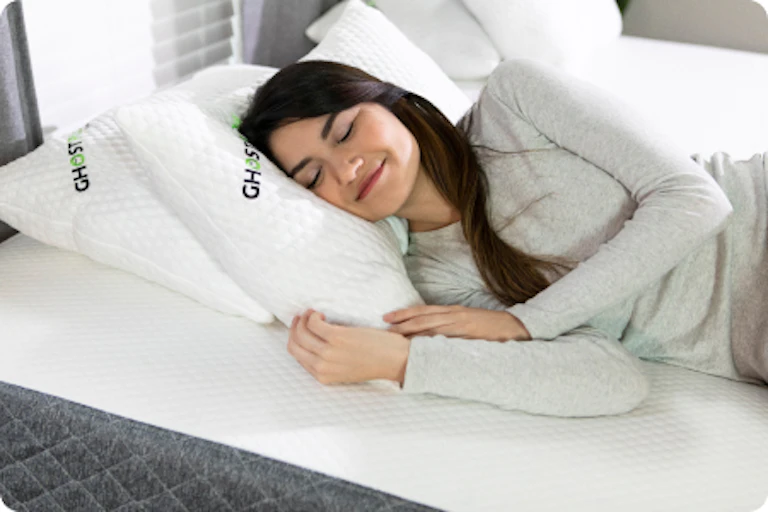To choose the right mattress for reducing snoring, consider purchasing an adjustable bed or a mattress with customizable firmness and support. This allows you to elevate your head and neck, keeping your airways open and reducing snoring.
Additionally, look for a mattress made with hypoallergenic materials to prevent allergies and aid breathing. A memory foam mattress can also be a good choice as it conforms to the contours of your body, providing comfort and support while reducing pressure points that may cause snoring.
Getting a good night’s rest is crucial to your overall health and well-being. However, snoring can disrupt both your sleep and your partner’s, leading to fatigue, irritability, and other health issues. If you’re struggling with snoring, your mattress could play a significant role in reducing or exacerbating the problem. In this guide, we’ll explore the key factors to consider when choosing a mattress to reduce snoring and help you improve your quality of sleep.

Credit: www.wantmattress.com
The Link Between Mattress Type And Snoring
How Mattress Type Can Contribute To Snoring
Your mattress can impact your quality of sleep, and that is especially true for people who snore. Snoring can be caused by several factors, including your sleeping position, weight, and even the type of mattress you sleep on. Here are some key points to understand how mattress type can contribute to snoring:
- Sleeping on an improperly supported mattress can lead to poor spinal alignment, which can cause snoring.
- A saggy innerspring mattress can make you sink in, putting extra pressure on your soft tissues, leading to snoring.
- A too-soft memory foam mattress can allow your head to sink, blocking your airways and leading to snoring.
- A too-firm latex mattress can cause pain and discomfort, leading to changes in your breathing pattern and, ultimately, snoring.
Differences Between Mattress Types (Innerspring, Memory Foam, Latex, Hybrid)
It’s essential to know the differences between different mattress types to choose the right one that will reduce snoring. Here is an overview of different mattress types and how they impact snoring:
- Innerspring mattresses offer more bounce, but they can cause motion transfer that disrupts your partner’s sleep. They are also not ideal for optimal body support, as they can cause pressure points.
- Memory foam mattresses provide excellent pressure relief, but they can absorb heat that makes you sleep hot. Some people may also find memory foam too soft and lacking bounce.
- Latex mattresses offer firm support and reduce motion transfer but may not provide enough pressure relief.
- Hybrid mattresses combine the features of innerspring and foam mattresses, offering both support and comfort.
Overview Of Different Mattresses And Their Impact On Snoring
When choosing a mattress, consider your sleeping position, weight, and comfort preferences. Here is an overview of how different mattresses impact snoring and who they are best suited for:
- Innerspring mattresses are best suited for back and stomach sleepers who prefer a bouncy feel and don’t have issues with motion transfer or pressure points.
- Memory foam mattresses are best suited for side sleepers who want pressure relief and body contouring to reduce snoring.
- Latex mattresses are best suited for back and stomach sleepers who prefer a firmer feel for proper support.
- Hybrid mattresses are suitable for all sleep positions as they combine the features of innerspring and foam mattresses. They provide both support and comfort and reduce snoring.
With these mattress types in mind, you can choose the right one that will reduce snoring and improve your sleep quality. Remember that the best mattress for you is one that offers the right balance of support and comfort while minimizing snoring.
Considerations When Choosing A Mattress
When it comes to choosing a mattress that reduces snoring, there are several important factors to consider. Your body type, sleeping position, allergies and sensitivities, personal preferences, and the impact of snoring on your sleeping partner are all crucial elements to bear in mind.
Let’s discuss each of these considerations in detail.
Body Type And Weight Distribution
Your body type and weight distribution play a key role in determining the right mattress for you. A mattress that provides adequate support can help align your spine, reduce discomfort, and prevent snoring. Consider the following:
- If you have a bigger build, you may need a mattress that offers more support. A firmer mattress can help reduce sagging and provide better alignment.
- If you have a smaller frame, a softer (but not too soft) mattress might be the best choice, as it can provide support without being too firm.
- Similarly, if you have broader shoulders or hips, you may need a mattress that can accommodate those areas and provide proper support.
Sleeping Position
Your sleeping position can also impact snoring. Depending on your position, certain mattresses may be more suitable. Here is a breakdown of the best mattresses for different sleeping positions:
- Back sleepers: A firmer mattress is recommended as it offers greater support and can help keep the spine aligned.
- Side sleepers: A medium-firm mattress can provide support while still being comfortable for those who sleep on their side.
- Stomach sleepers: A firmer mattress is recommended to prevent the body from sinking in too deeply, which can cause the airway to become restricted.
Allergies And Sensitivities
Allergies and sensitivities can also play a role in mattress selection. A hypoallergenic mattress may be necessary to prevent snoring caused by allergies or other sensitivities. Consider the following:
- If you have dust allergies, a mattress made from hypoallergenic materials can reduce the likelihood of an allergic reaction.
- Those with sensitive skin may find comfort on a mattress made from organic, chemical-free materials.
- If you have asthma, avoid mattresses that can trap dust and bacteria.
Personal Preferences (Soft, Medium, Or Firm Mattress)
Your personal preference for mattress firmness can also impact snoring. While personal preferences may vary, there are some general guidelines to consider:
- A medium-firm mattress is often the best choice as it can provide support while still being comfortable.
- Those who prefer a softer mattress should look for models that still offer adequate support and do not sink in too deeply.
- If you prefer a firmer mattress, ensure that it still provides adequate pressure relief and does not cause discomfort.
Impact Of Snoring On Sleeping Partners
Finally, it is important to consider the impact of snoring on sleeping partners. A mattress that provides adequate support can help reduce snoring, which can lead to better sleep for both partners. Consider the following:
- A mattress that isolates motion can help prevent disturbances caused by snoring.
- Look for a mattress with proper airflow to prevent overheating, which may worsen snoring.
- If your partner snores heavily, consider a mattress that reduces motion transfer and provides individualized support for each person.
Choosing the right mattress to reduce snoring requires consideration of multiple factors. By keeping these considerations in mind, you can improve your sleep and quality of life.
Mattresses For Specific Types Of Snorers
Back Sleepers Who Snore
If you sleep on your back and have a snoring problem, it’s worth considering a mattress that supports your spine’s natural curvature while keeping your airways open. Here are some features to look for:
- Medium-firm support that allows your hips and shoulders to sink slightly into the mattress. This will keep your spine aligned and reduce pressure points that can obstruct breathing.
- Memory foam or latex materials that conform to your body shape and provide gentle, consistent support.
- Zoned support that’s firmer around the hips and midsection to prevent sinking and maintain proper alignment.
Side Sleepers Who Snore
If you’re a side sleeper and snore, consider a mattress that supports your body’s contours while cushioning pressure points. Additionally, look for the following features:
- A soft to medium comfort level that allows for greater cushioning around the shoulders and hips where side sleepers often experience pressure points.
- Memory foam or latex materials that contour to your body shape while keeping your spine aligned.
- Comfort layers that provide additional cushioning without sacrificing support.
Snorers With Sleep Apnea
If you have sleep apnea, you need a mattress that not only supports your body but keeps your airways open. Here are some features to look for:
- Medium-firm support that promotes spinal alignment while keeping your airways open.
- A high-density memory foam or latex materials that conform to your body shape and reduce motion transfer.
- Elevated head and/or foot support that can help keep your airways open.
Snorers With Allergies
Picking a mattress for snorers with allergies can be challenging, but there are ways to reduce your exposure to allergens. Some features to consider include:
- Hypoallergenic materials that prevent the buildup of allergens such as dust mites, mold, and mildew.
- Removable, washable mattress covers that can easily be cleaned, reducing the overall amount of allergens on your mattress.
- Materials such as latex that are naturally mold and mildew resistant.
Snorers With Acid Reflux
If you have acid reflux, you need to keep your upper body elevated while you sleep, and avoid sleeping flat. Look for a mattress that offers the following features:
- Adjustable bed frames that let you elevate your upper body while you sleep.
- A wedge pillow that can prop your head up and prevent stomach acid from flowing back into your esophagus.
- A medium-firm mattress that offers proper spinal alignment and prevents sinking in areas where you need elevation.
Tips For Maintaining A Mattress
How Do I Choose The Right Mattress To Reduce Snoring?
Do you often find yourself struggling to sleep peacefully because your partner’s snoring keeps you up all night? While snoring can be caused by several factors including allergies, respiratory issues, and sleep apnea, sometimes, the root cause can be as simple as an uncomfortable mattress.
We’ll provide you with some tips on how to choose the right mattress and maintain it to reduce snoring.
How To Take Care Of A Mattress To Prevent Snoring
Maintaining your mattress is a crucial step in preventing snoring. Here are some tips to keep in mind:
- Vacuum your mattress regularly to remove dust and dirt.
- Flip and rotate your mattress every three months to prevent sagging.
- Protect your mattress from spills or stains using a waterproof cover.
- Use an air purifier in the bedroom to keep the air clean and reduce allergens.
Cleaning And Maintenance Techniques
Keeping your mattress clean should be a part of your regular cleaning routine. Here’s what you need to do:
- Remove all the bedding and wash them in hot water and detergent to kill all the germs and allergens.
- Sprinkle baking soda on the mattress and let it sit for about 15 minutes to absorb any odors. Vacuum it off afterward.
- Use a mild detergent and warm water to clean any stains from the mattress.
When To Replace A Mattress
No matter how well you take care of your mattress, there comes a time when you need to replace it. Here are some signs that you should look out for:
- If you wake up feeling tired and achy, it means that your mattress is not providing you the support you need.
- If you can feel any lumps or sagging in the mattress, it’s time to replace it.
- If your mattress is more than 8-10 years old, it’s time for a new one.
These are some of the things you need to keep in mind when choosing and maintaining a mattress to reduce snoring. Remember, a good night’s sleep is crucial for your health and well-being, so invest in a comfortable mattress to wake up feeling refreshed and energized every day.
Frequently Asked Questions Of How Do I Choose The Right Mattress To Reduce Snoring?
What Type Of Mattress Is Best For Reducing Snoring?
Memory foam or adjustable air mattresses are great options for reducing snoring as they contour to the body and provide optimal support.
How Important Is Mattress Firmness When It Comes To Snoring?
A medium-firm mattress is typically recommended for reducing snoring. It provides enough support to keep your airways open without putting too much pressure on your body.
Can The Wrong Pillow Cause Snoring?
Yes, the wrong pillow can contribute to snoring by angling your head and neck in a way that obstructs your airways. Opt for a pillow that supports your head and neck while keeping them aligned with your spine.
Does Sleeping Position Affect Snoring?
Yes, sleeping position can greatly impact snoring. Sleeping on your back can cause the tongue and soft palate to collapse, obstructing your airways and increasing the likelihood of snoring.
How Often Should I Replace My Mattress To Reduce Snoring?
It is recommended to replace your mattress every 7-10 years, as an old mattress can lose its support and cause snoring. However, if your current mattress is causing significant issues with snoring, it may be best to replace it sooner.
Conclusion
Ultimately, choosing the right mattress to reduce snoring requires a comprehensive understanding of your individual needs and preferences. Through careful consideration of factors such as your sleeping position, weight, and any existing medical conditions, you can identify the types of mattresses that are likely to be most effective for you.
Additionally, it’s important to take the time to research various brands and models to determine which products have the strongest reputation for alleviating snoring-related issues. By following these guidelines and considering all available options, you can improve your sleep quality and reduce the negative health effects of snoring.
Remember, investing in a quality mattress is an investment in your overall health and wellbeing, and is well worth the effort and expense in the long run.





Leave a Reply